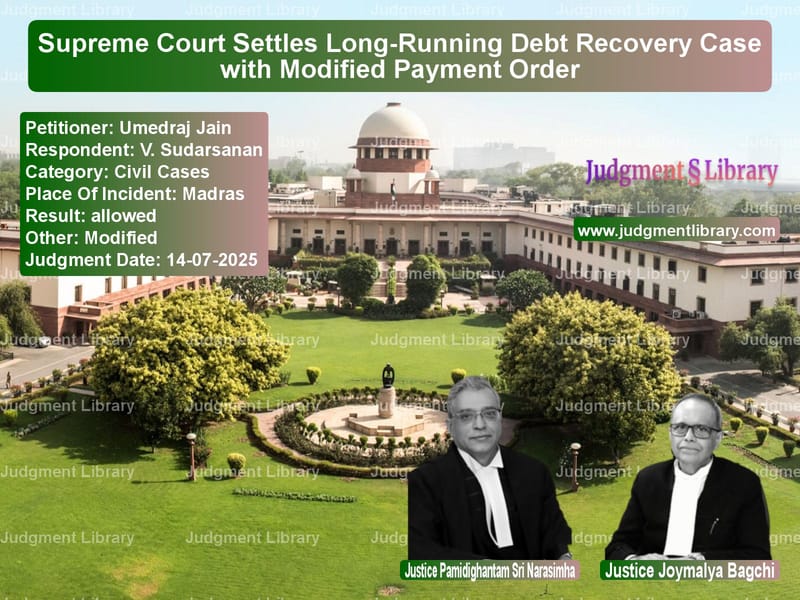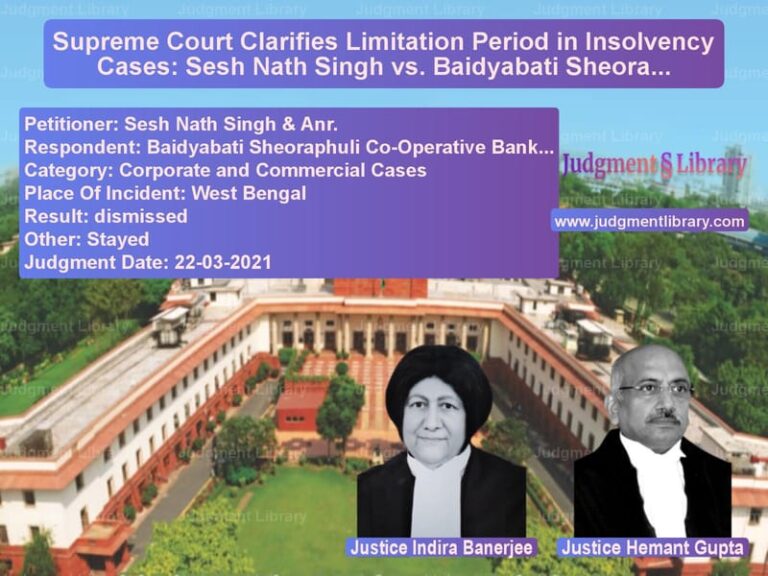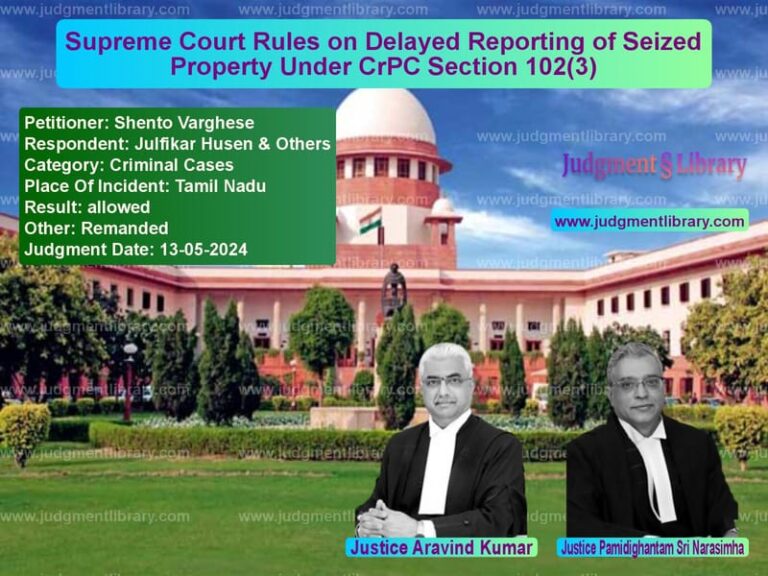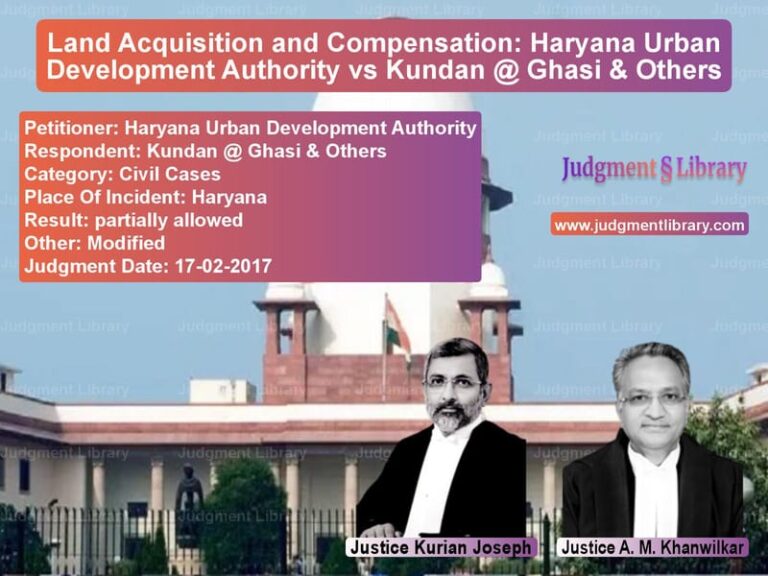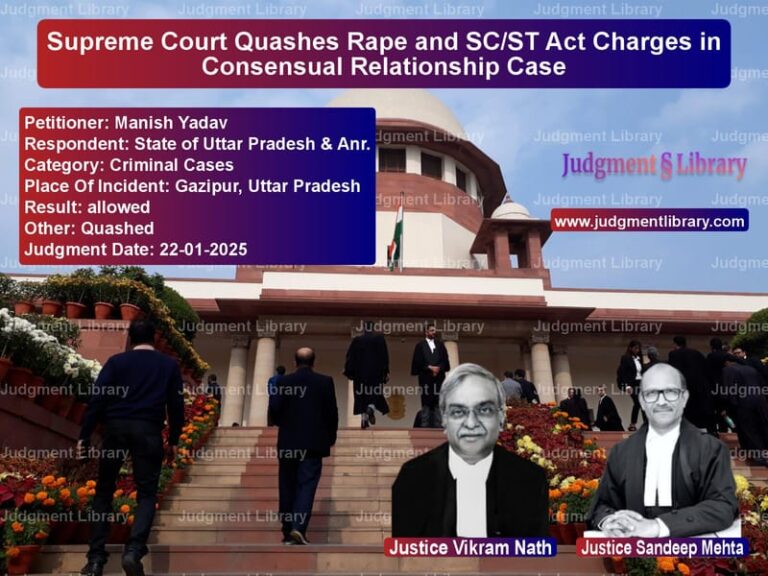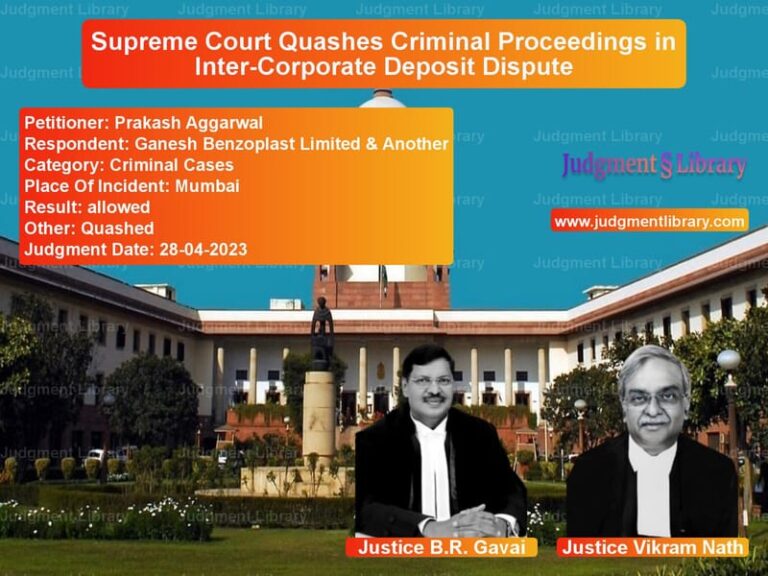Supreme Court Settles Long-Running Debt Recovery Case with Modified Payment Order
In a classic example of how the judiciary can bring closure to protracted legal battles, the Supreme Court has delivered a practical and balanced judgment in a long-running debt recovery case that had stretched for over a decade. The case involved Umedraj Jain, who found himself entangled in a complex web of mortgage debt after purchasing a property that came with significant legal baggage, ultimately leading to a Supreme Court intervention that balanced legal rights with practical realities.
The origins of this legal saga date back to a mortgage transaction where V. Sudarsanan had loaned Rs. 58,50,000 to the original property owners through a mortgage by deposit of title deeds. When the borrowers defaulted, Sudarsanan filed a suit for recovery of Rs. 79,69,544, which included the principal amount and accumulated interest. While this lawsuit was pending, Umedraj Jain entered the picture by purchasing the very same property from the original defendants, a decision that would embroil him in years of litigation and substantial financial liability.
Jain attempted to protect his interests by filing an application to be impleaded in the ongoing suit, but this legal maneuver proved unsuccessful when his application was dismissed, and this decision attained finality. This meant that Jain had purchased a property that was subject to ongoing litigation without being able to directly participate in those proceedings – a situation that would have significant consequences for his financial obligations.
The Legal Proceedings Unfold
The trial court delivered its judgment on October 5, 2010, decreeing the suit in favor of Sudarsanan. This was followed by a final decree on August 29, 2011, which formally established the liability at Rs. 79,69,544 with further interest at 9% per annum on the principal amount of Rs. 58,50,000. Jain challenged this judgment and decree through the appropriate legal channels, but his efforts proved unsuccessful at every turn.
As the litigation progressed, the financial stakes continued to grow. Jain ultimately paid a total amount of Rs. 1.15 crore to satisfy the decree, a sum significantly higher than the original decree amount due to accumulating interest and legal costs. The Master of the High Court acknowledged this substantial payment by closing the proclamation proceedings on August 12, 2016, which should have signaled the end of this lengthy legal battle.
However, the matter took another turn when Sudarsanan filed an application before the Single Judge of the High Court, challenging the order that had closed the proclamation proceedings. He contended that despite Jain’s payment of Rs. 1.15 crore, there was still an outstanding amount of Rs. 19.24 lakhs due to him. The Single Judge accepted this argument, set aside the order closing the proclamation proceedings, and directed Jain to pay the additional amount of Rs. 19,54,946.
When Jain appealed this decision to the Division Bench of the High Court, he found no relief as the appellate bench affirmed the Single Judge’s order. This left Jain with no option but to approach the Supreme Court, filing a special leave petition that would eventually bring this matter before the nation’s highest court.
The Supreme Court’s Intervention
The Supreme Court, comprising Justice Pamidighantam Sri Narasimha and Justice Joymalya Bagchi, took a practical approach to resolving this long-standing dispute. The Court noted that despite issuing notice on May 7, 2019, the matter had prolonged for various reasons, and the time was ripe for a definitive resolution.
The Court demonstrated judicial wisdom by recognizing the toll that prolonged litigation takes on all parties involved. The judges observed that “When the case was listed before us, we suggested the parties that they must try and settle the dispute in view of the long-standing litigation involving heavy expenditure and wastage of valuable time.”
This proactive approach reflects the Supreme Court’s role not just as an interpreter of law but as an institution dedicated to resolving disputes in a manner that serves the broader interests of justice. The Court acknowledged the efforts made by Mr. V. Prabhakar, learned senior counsel for the respondent, noting that “Mr. V. Prabhakar, learned senior counsel for the respondent, has tried his best but the matter has remained inconclusive.”
The Balanced Resolution
After careful consideration of all aspects of the case, the Supreme Court arrived at a solution that balanced the legal rights of the parties with the practical realities of the situation. The Court stated that “Having considered the matter in detail and in the facts and circumstance of the case, we are of the opinion that interest of justice will be sub-served if we direct the appellant to pay to the respondent a sum of Rs. 15 Lakhs as full and final settlement of all dues and in complete satisfaction of the final decree.”
This decision represents a modification of the High Court’s order, which had directed payment of Rs. 19,54,946. By reducing the amount to Rs. 15 lakhs and declaring this as full and final settlement, the Supreme Court provided a clean break to the litigation that had consumed so much time and resources.
The Court was careful to note that “The order is confined to the facts of the present case and shall not be treated as a precedent.” This qualification is important as it recognizes that while the Court was exercising its equitable jurisdiction to arrive at a fair solution in this specific case, the decision should not be seen as establishing a general principle that could be routinely invoked in similar matters.
The Final Order and Its Implications
The Supreme Court allowed the appeal in part, modifying the High Court’s order and providing a clear path forward. The Court directed that “the appellant to pay to the respondent the amount of Rs. 15 Lakhs within a period of two months from today as full and final settlement of all dues.”
This two-month timeframe provides reasonable opportunity for compliance while ensuring that the matter does not drag on indefinitely. The specification that this payment constitutes “full and final settlement of all dues” brings much-needed certainty to both parties, ensuring that no further claims can be made in relation to this debt.
The judgment serves as a reminder of the importance of conducting proper due diligence before purchasing properties, especially when those properties are subject to ongoing litigation or encumbrances. Jain’s experience underscores the risks involved in purchasing property without fully understanding the legal liabilities attached to it.
From a broader perspective, this case illustrates how the Supreme Court can exercise its discretion to arrive at practical solutions that serve the interests of justice, even while operating within the framework of established legal principles. The reduction of the claimed amount acknowledges the substantial payments already made by Jain while still recognizing the legitimate financial interests of Sudarsanan.
The resolution also highlights the growing trend of courts encouraging settlements and using their discretionary powers to bring finality to long-running disputes, particularly in civil matters where continued litigation often benefits neither party. By taking a balanced approach that considered the history of the case, the amounts already paid, and the need for closure, the Supreme Court has provided a template for resolving complex civil disputes in a manner that serves the ultimate goal of justice.
This judgment stands as a testament to the judiciary’s role in not just interpreting the law but in ensuring that legal processes ultimately serve the cause of justice in a practical and meaningful way. It demonstrates that sometimes, the most legally sound outcome is one that recognizes the human and financial costs of prolonged litigation and seeks to bring matters to a fair and reasonable conclusion.
Petitioner Name: Umedraj Jain.Respondent Name: V. Sudarsanan.Judgment By: Justice Pamidighantam Sri Narasimha, Justice Joymalya Bagchi.Place Of Incident: Madras.Judgment Date: 14-07-2025.Result: allowed.
Don’t miss out on the full details! Download the complete judgment in PDF format below and gain valuable insights instantly!
Download Judgment: umedraj-jain-vs-v.-sudarsanan-supreme-court-of-india-judgment-dated-14-07-2025.pdf
Directly Download Judgment: Directly download this Judgment
See all petitions in Debt Recovery
See all petitions in Property Disputes
See all petitions in Judgment by P.S. Narasimha
See all petitions in Judgment by Joymalya Bagchi
See all petitions in allowed
See all petitions in Modified
See all petitions in supreme court of India judgments July 2025
See all petitions in 2025 judgments
See all posts in Civil Cases Category
See all allowed petitions in Civil Cases Category
See all Dismissed petitions in Civil Cases Category
See all partially allowed petitions in Civil Cases Category

